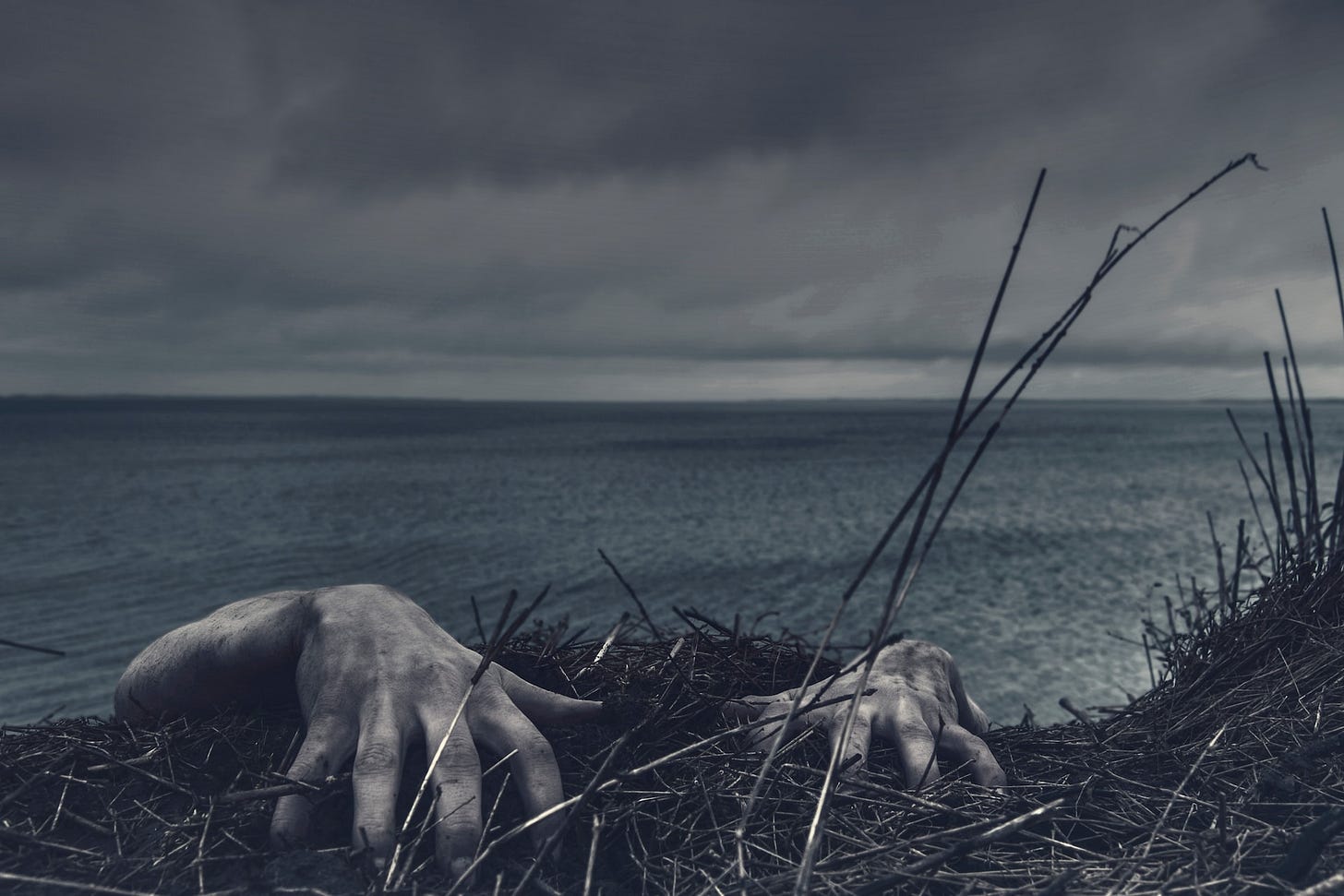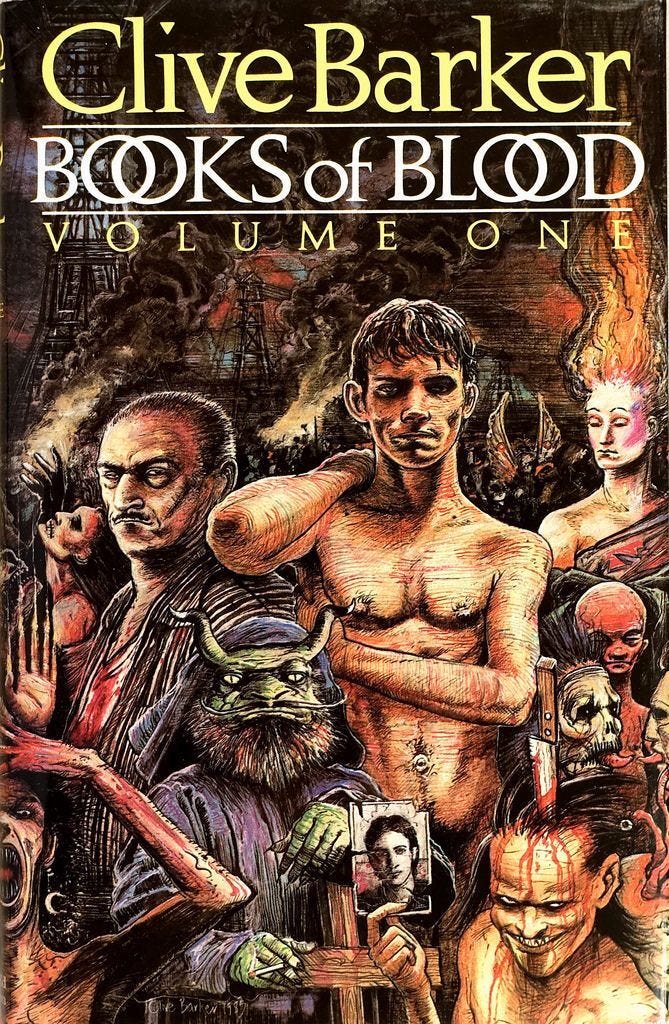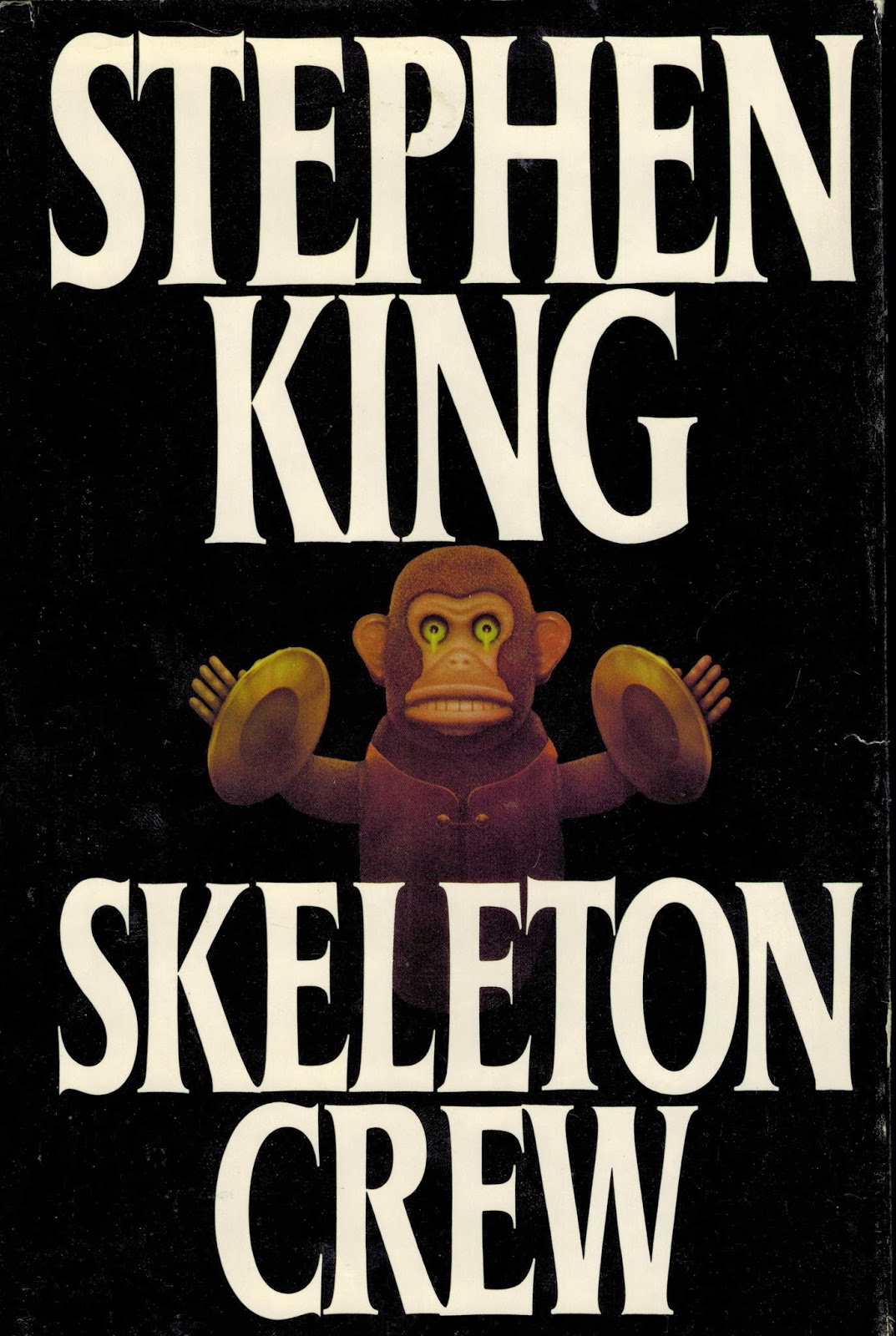The Horror Feeding Our Fantasy and Science Fiction Hunger
Speculative horror could catapult the genre back into the public consciousness.

In 1984, Clive Barker introduced the world to his weird and macabre horror fiction through the short story collection, Books of Blood. It entertained readers with bizarre tales that were just as much fantasy as they were horror. And it is deeply horror (discretion advised). When I read it for the first time in college, I was struck by Barker’s unconventional use of speculative elements. Stephen King praised Books of Blood, leading to a quote from him appearing on the first US edition of the book: "I have seen the future of horror and his name is Clive Barker."
Barker, King and many of their contemporaries, Ray Bradbury, Dean Koontz, Richard Matheson, Anne Rice and Peter Straub, have all written short stories and novels that cross over into fantasy and science fiction, even being nominated for awards in those genres. Yet, most are still considered foremost horror writers, a dying breed of an old guard that profited by writing about grim subject matter. New voices that explore similar themes find themselves lost in general fiction or misplaced in fantasy and science fiction.
Most libraries and bookstores no longer contain horror sections, in stark contrast to the 80s, when horror fiction peaked, alongside horror cinema. For a time, I lamented the dwindling inventory from traditional publishers, attributed primarily to dwindling sales numbers as the populace turned toward other genres. Post 9/11, at least in America, we were catapulted into an age fed by real life horrors and a few years afterward true crime became the predominant mode of consuming “horror”.
While cinema experiences the occasional resurgence of distinctive flavors of horror, novels have struggled to capture the unique essence of horror possible in conjunction with fantasy and science fiction. Authors like Jeff VanderMeer gave us a peek at what’s possible in his book Annihilation, a rarity in a blended genre that is relying on a select few to fill the void. The industry is ready for a resurgence, for authors to lean hard into the horror possible in speculative by captivating a wider audience.
Morbidity as a Fear Catalyst
The key ingredient of horror is that it’s meant to evoke fear, primarily by exploring our relationship to death. Science fiction, on the other hand, explores the boundaries of what’s possible, while fantasy often comments on our association with the world around us. A better melding of the three would be to introduce the horrors of mutation, a future morbid state of nature in which we become trapped in an unfamiliar state, changing our world forever. The inability to escape from that situation is a key tenant of horror.
It’s an evolution gone wrong as a result of pathogens, alien biotoxins or celestial events we can’t explain. Death should not be the end result. The horror is in the idea that we mutate into an unrecognizable shell of our former selves, trapped in stasis, forced to live in a new hierarchy of beings, providing interesting contrasts. Control, or lack of control can be horrific to many, as familiar and terrifying as death. Removing that control within this framework could produce interesting storylines.
A Future Unknown
Another key ingredient of horror is a fear of the unknown. In a classic sense, creature features explored a familiar unknown, drawing parallels with what it means to be human, or inhuman. Frankenstein’s monster, vampires, werewolves, zombies and all beings with a foundational human biology, forced us to study our capacity for evil, but under the guise of a creature that gave us a healthy distance from reality. Science fiction and fantasy melded with horror is the perfect opportunity to continue the tradition.
In more recent years, the resurgence of AI allows us to study the unknown through uncertain outcomes. Artificial intelligence run amok is a mainstay of science fiction horror. Film opened the door and has provided a swath of visual material when the public needed help seeing what had once been impossible. Now that we live in an age where the public is exposed to amazing new advancements in science and medicine, it’s the right time to illustrate the consequences of our overreach. It takes less effort to suspend disbelief due to advancements, giving readers a taste of the potential horrors on the horizon.
Parallel Worlds and Dangerous Dimensions
One of my favorite novellas is Stephen King’s book, The Mist. Originally published in Dark Forces, a horror anthology, and later included in King's 1985 collection Skeleton Crew, the story examines the consequences of a dimensional tear caused by secret government experiments. It received fair reviews, but it’s also castigated for a Hitchcockian ending, a reader interpreted denouement that left me wanting a definitive conclusion. What it lacked in completeness, it made up for in approaching a subject often reserved for hard science fiction.
Parallel worlds or dimensions that invade our own, continue to be a subject that is fascinating and could provide a refreshing view of horror fiction. The angle has been contaminated by Marvel’s multiverse concept, which overtly suggested parallel worlds must exist beside our own in some sort of reflective mirror or prism. In The Mist, the world and black hole of horrors that seeps into our own, has no resemblance to Earth’s biological systems. For an imaginative author, it’s an opportunity to write a fantastical story, filled with original creatures and ecosystems.
Dark Quests
J.R.R. Tolkien, George R.R. Martin, Brandon Sanderson and Terry Goodkind, to name a few, have all made their living by crafting epic fantasies. Massive worlds with ensemble casts of characters keep bringing a large, willing audience of readers back for more. A few of the adventures may even trend darker in theme, the result of deadly beasts or twisted antagonists, but it never quite transitions to horror. The fear is always wrapped up in a distant observation. We’re entranced, we even care, but we never quite internalize that fear. Epic horror fantasy is a broader unexplored domain.
It’s possible the chasm between horror and epic fantasy is too large a divide to cross. Horror is better served with constraints, a confined space that prevents escape, while epic fantasy lives and breathes in wide open spaces across distant lands. Attempts have been made at recreating horror’s visceral undertones in fantasy, giving rise to a subgenre known as “grimdark”. It’s reminiscent of the paperback schlock produced in the 80s to keep up with demand, yet it makes the same mistake by confusing shock with fear. There’s still room for an author to produce a more valiant effort.
Conclusions
Instead of trying to resurrect horror using the makeup of its natural DNA, authors could take advantage of speculative elements to mutate it entirely. Fantasy and science fiction have always played a cooperative role in delivering the horror genre to readers, and it’s an opportunity to blend all three into storylines that would appeal to the masses. It might even catapult the genre back into the public consciousness, a frightful concept to consider.




Cool read! I’m a fan of really any genre x with horror, it usually seems to work. I’ve been reading a lot of Cormac McCarthy lately, on Blood Meridian right now, and the way he blends western and horror is just incredible. Such a freaky, unsettling, yet perfect western journey… of hunting for scalps deep in Mexico of course.
To me, horror is more effective when it's understated and leaves the reader to fill in the details from the darkest depths of his imagination. It's easier to do that with writing than in films, where you usually get to face the monster head on. Beowulf is probably one of the earliest horror stories and even now it makes me shudder. Back in the 50s and 60s, there were a lot of horror films on TV, such as The Fly, that we might laugh at today but they sure seemed creepy back then. Around 1960 I saw a film version of Jules Verne's The Time Machine, where the monsters were a devolved race of cannibalistic humans. Verne may have invented sci-fi/horror, as he wrote in the 1800s.